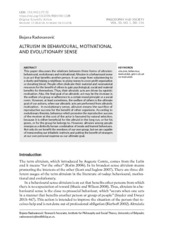Приказ основних података о документу
Altruism in Behavioural, Motivational and Evolutionary Sense
| dc.creator | Radovanović, Bojana | |
| dc.date.accessioned | 2019-04-24T08:01:32Z | |
| dc.date.available | 2019-04-24T08:01:32Z | |
| dc.date.issued | 2019 | |
| dc.identifier.issn | 0353-5738 | |
| dc.identifier.uri | http://journal.instifdt.bg.ac.rs/index.php?journal=fid&page=article&op=view&path%5B%5D=https%3A%2F%2Fdoi.org%2F10.2298%2FFID1901122R | |
| dc.identifier.uri | http://rifdt.instifdt.bg.ac.rs/123456789/1955 | |
| dc.description.abstract | This paper discusses the relations between three forms of altruism: behavioural, evolutionary and motivational. Altruism in a behavioural sense is an act that benefits another person. It can range from volunteering to a charity and helping a neighbour, to giving money to a non-profit organisation or donating blood. People often dedicate their material and nonmaterial resources for the benefit of others to gain psychological, social and material benefits for themselves. Thus, their altruistic acts are driven by egoistic motivation. Also, the final goal of an altruistic act may be the increase in the welfare of a group or adherence to a certain moral principle or a social norm. However, at least sometimes, the welfare of others is the ultimate goal of our actions, when our altruistic acts are performed from altruistic motivation. In evolutionary sense, altruism means the sacrifice of reproductive success for the benefit of other organisms. According to evolutionary theories, behaviour which promotes the reproductive success of the receiver at the cost of the actor is favoured by natural selection, because it is either beneficial for the altruist in the long run, or for his genes, or for the group he belongs to. However, altruism among people emerges as a distinctly human combination of innate and learned behaviours. Not only do we benefit the members of our own group, but we are capable of transcending our tribalistic instincts and putting the benefit of strangers at our own personal expense as our ultimate goal. | en |
| dc.description.abstract | Ovaj rad govori o odnosima između altruizma u bihejvioralnom, evolutivnom i motivacionom smilsu. Altruizam u smislu ponašanja je radnja u kojoj akter snosi trošak (materijalni ili nematerijalni) a od koje benefit ima druga osoba. Može da se kreć e od volontiranja za neprofitne organizacije i pružanja pomoći osobama u nevolji, do davanju novca u dobrotvorne svrhe ili doniranja krvi. Ljudi često posveć uju svoje materijalne i nematerijalne resurse u korist drugih kako bi stekli psihološke, socijalne i materijalne koristi za sebe. Tada su njihova altruistična dela vođena egoističnim motivima. Takođe, krajnji cilj altruističnog čina može biti poveć anje blagostanja grupe ili poštovanje određenog moralnog principa ili društvene norme. U evolucionom smislu, altruizam znači žrtvovanje reproduktivnog uspeha u korist drugih organizama. Prirodna selekcija favorizuje ovakvo ponašanje kada je ono ili korisno za altruistu na duži rok, ili za njegove gene, ili za grupu kojoj pripada. Međutim, altruizam među ljudima se javlja kao jedinstvena kombinacija urođenog i naučenog ponašanja. Ne samo da postupamo s ciljem povećanja sopstvenog blagostanja i blagostanja članova grupe kojoj pripadamo, već često postupamo u korist potpunih stranaca, imajući kao krajnji cilj njihovo blagostanje, kada naše altruistično ponašanje proističe iz altruistične motivacije. | sr |
| dc.language.iso | en | sr |
| dc.publisher | Beograd : Institut za filozofiju i društvenu teoriju | sr |
| dc.rights | openAccess | sr |
| dc.rights.uri | https://creativecommons.org/licenses/by-nc-nd/4.0/ | |
| dc.source | Filozofija i društvo/Philosophy and Society | sr |
| dc.subject | altruism | sr |
| dc.subject | behaviour | sr |
| dc.subject | motivation | sr |
| dc.subject | gen-culture | sr |
| dc.subject | co-evolution | sr |
| dc.title | Altruism in Behavioural, Motivational and Evolutionary Sense | en |
| dc.type | article | sr |
| dc.rights.license | BY-NC-ND | sr |
| dcterms.abstract | Радовановић, Бојана; | |
| dc.citation.issue | 1 | |
| dc.citation.volume | 30 | |
| dc.citation.spage | 122 | |
| dc.citation.epage | 134 | |
| dc.identifier.doi | 10.2298/FID1901122R | |
| dc.type.version | publishedVersion | sr |
| dc.identifier.fulltext | http://rifdt.instifdt.bg.ac.rs/bitstream/id/4528/bitstream_4528.pdf |

